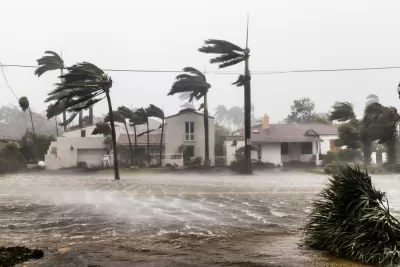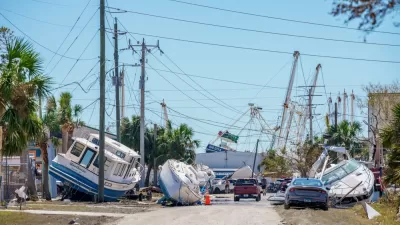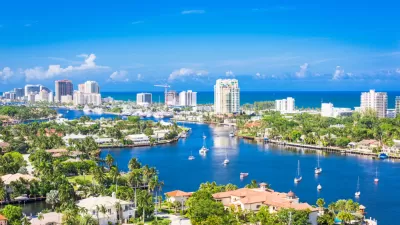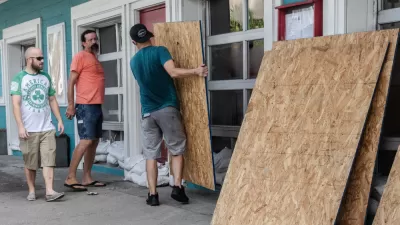One of the most powerful hurricanes to hit the mainland United States in decades will be a major test for a governor with presidential aspirations as well as his constituents in the nation's third most populous state.

“Ian was just shy of Category 5 status as it made landfall on Cayo Costa, Fla., [near Fort Myers and Cape Coral in Lee County] around 3:05 p.m., according to the National Hurricane Center,” reported The New York Times on September 28.
Ian knocked out power to nearly 1.5 million customers across the state, according to PowerOutage.us. Forecasters said to expect “extremely dangerous” winds and rain in the coming hours as the storm moves inland. Follow its path here.
In a 10 pm update on Wednesday, the National Hurricane Center indicated that Hurricane Ian continues “to batter the Florida Peninsula with catastrophic storm surge, winds and flooding.”
Adam Aton, a climate change reporter for Politico’s E&E News, headlined Wednesday's Power Switch newsletter on the climate change connection to the storm, “Hurricane Ian is a peek into the future,” and briefly noted the political test ahead for the governor.
After four years crafting a national profile as a partisan warrior, Republican Florida Gov. Ron DeSantis now faces a natural disaster that will require much different skills, writes Matt Dixon.
He's already toned down his attacks — even praising the Biden administration's preemptive moves to prepare for Ian. How he handles this challenge could shape his political future.
DeSantis Test
“DeSantis may emerge more popular or open himself up to criticism” based on his response to the epic storm, writes Dixon in the source article. “While no elected official wishes for a major natural disaster, hurricanes offer almost unlimited access to free national media, a huge boost to any governor’s political fortunes.”
Dixon noted that DeSantis' predecessor, Rick Scott, who went on to defeat a three-term Democratic incumbent senator, Bill Nelson in 2018, the same year in which DeSantis narrowly won his first term, “oversaw statewide responses to four hurricanes during his eight years as governor.” That would be Hurricanes Hermine, Matthew, Irma, and Michael. More hurricanes to hit Florida listed here.
As Aton noted in the newsletter, DeSantis has changed his rhetoric in dealing with President Biden, wrote Dixon.
DeSantis is also setting aside his overtly pugilistic politics as Ian bears down. He praised the Biden administration after the president on Saturday declared a state of emergency for Florida, which allows FEMA to begin coordinating efforts ahead of the arrival of the storm. It was a rare compliment from a governor who has used Biden as a political heel on a range of partisan issues as he prepares for what could be a 2024 run for the White House.
Property Insurance
“Set aside the immediate life-and-death challenges of responding to a storm, one of the biggest issues DeSantis faces is how the storm will affect Florida’s already faltering property insurance market,” writes Dixon.
Many have long feared that a large hurricane could force some of Florida’s smaller domestic carriers to go belly up, further damaging the state’s already rickety marketplace and leaving policyholders hanging.
Divisiveness
A warning from the mayor of Miami Beach on what to avoid, reflecting on the governor's handling of the coronavirus pandemic.
“I hope the divisiveness that has defined Florida and national politics doesn’t impact the ability of people to follow the directions of their leaders,” said Democratic Miami Beach Mayor Dan Gelber. “Florida politicized vaccines and masks, and the results were tragic. We can’t afford to make the same mistake again.”
Related:
- The Great American Exodus: A Conservative's Perspective, Sept. 28, 2022
- Climate Negligence in Florida? September 12, 2017
Hat tip to Adam Aton who wrote the POLITICO Power Switch newsletter.
FULL STORY: DeSantis faces the true test of any Florida governor

Planetizen Federal Action Tracker
A weekly monitor of how Trump’s orders and actions are impacting planners and planning in America.

Restaurant Patios Were a Pandemic Win — Why Were They so Hard to Keep?
Social distancing requirements and changes in travel patterns prompted cities to pilot new uses for street and sidewalk space. Then it got complicated.

Map: Where Senate Republicans Want to Sell Your Public Lands
For public land advocates, the Senate Republicans’ proposal to sell millions of acres of public land in the West is “the biggest fight of their careers.”

Maui's Vacation Rental Debate Turns Ugly
Verbal attacks, misinformation campaigns and fistfights plague a high-stakes debate to convert thousands of vacation rentals into long-term housing.

San Francisco Suspends Traffic Calming Amidst Record Deaths
Citing “a challenging fiscal landscape,” the city will cease the program on the heels of 42 traffic deaths, including 24 pedestrians.

California Homeless Arrests, Citations Spike After Ruling
An investigation reveals that anti-homeless actions increased up to 500% after Grants Pass v. Johnson — even in cities claiming no policy change.
Urban Design for Planners 1: Software Tools
This six-course series explores essential urban design concepts using open source software and equips planners with the tools they need to participate fully in the urban design process.
Planning for Universal Design
Learn the tools for implementing Universal Design in planning regulations.
Heyer Gruel & Associates PA
JM Goldson LLC
Custer County Colorado
City of Camden Redevelopment Agency
City of Astoria
Transportation Research & Education Center (TREC) at Portland State University
Camden Redevelopment Agency
City of Claremont
Municipality of Princeton (NJ)





























